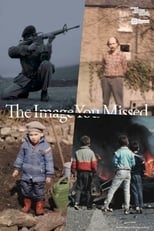Stephen Campbell
May 15, 2019
4/10
Just didn't work for me
I had a line that used to end the film but I ended up cutting it out. It said: "film is the art of conjuring ghosts, not getting rid of them." I used to think filming could act like a kind of catharsis and exorcism: you film to try to get something off your chest so that you can get rid of it. But I never found it to play out that way, because by making a film you're essentially creating a ghost that you're going to live and travel around the world with, and talk to people about. Essentially, you're making something that will live on - you're not getting rid of anything. So, it wasn't really cathartic at all. That said, I already felt a certain peace in my relationship with my father before I started making the film. I wasn't in a turmoil trying to work it out, so to speak. But I did feel like there was some unfinished business to attend to, and I wanted to know more about him and his world, and looking back I feel as though I did build something which now has its own existence in the world, and there's something really satisfying about that. But it’s always an unfinished process. I was thinking a lot about the idea of reconciliation when I was making the film. Reconciliation between me and my father, between North and South, between his time and mine. I thought a lot about what it is like to place one image next to another. There's always something missing in between, a weirdly primal desire of wanting to make a whole out of what is not. It's almost like the idea of going back to the womb - a certain desire that can never truly be fulfilled.
- Donal Foreman; "The Personal and the Political: An Interview with Donal Foreman" (Leonardo Goi); Mubi (May 14, 2018)
if it had been just about my father and my relationship with my father, without those added layers about politics and history and cinema to engage with, I don't think I would have made the film. I saw his archive as a pretext to grapple with a lot of interesting questions and challenge myself as a film-maker to deal with political questions that I hadn't found a way to do in my films before.Unfortunately, there's little evidence of this in the film, with the Troubles never being examined beyond that of an intermittent surface-level presentation. Tied to this is the single biggest issue I had with the film, a question I found myself asking after about twenty minutes – why should I, or anyone else, care that Foreman had a tough relationship with his father? Who doesn't? I wouldn't expect anyone to sit through a documentary in which I work out my daddy issues, not unless those issues speak to a more all-encompassing truth, and I'm really not sure why Foreman should be any different, as he certainly provides no such reason in the film. And precisely because he doesn't allow the personal and the political to inform one another, the film just comes across as a guy with a camera watching old footage shot by his dad. Maybe I didn't respond correctly to the form, maybe I wasn't the target demographic (at the screening I attended, I was the youngest person in the cinema by a good ten or fifteen years at least, and I'm 40), I'm not sure, but whatever the case, I was just left wondering as to what the purpose of any of it was.
